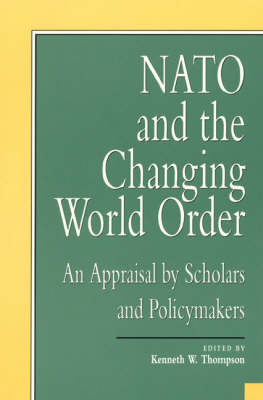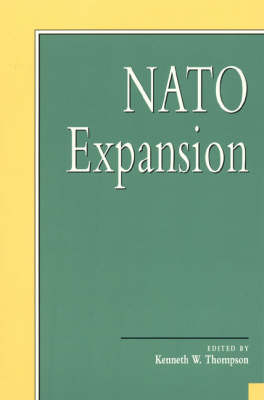Miller Center Series on a New World Order
2 primary works • 3 total works
Book 2
This volume explores subjects such as the rise of modern nationalism and its potentially destructive nature in regard to world order; arms control and disarmament in the nuclear age; and the problems of national self-determination and national minorities. They also take up the issue of human rightsowho is responsible for the promotion and enforcement of rights: the individual states and their citizens, or the international community? Contributors: William D. Jackson, James Piscatori, Moorhead Wright, W. David Clinton III, Lowell Gustafson, J.C. Garnett, Brian Porter, Michael Ross Fowler, Julie Marie Bunck, Robert Williams, Brian E. Klunk, Reed M. Davis, William R. Stevenson, Jr., Robert DeVries, Kenneth W. Thompson, Margaret P. Karnes, Harold K. Jacobson, and Inis L. Claude, Jr. Co-published with The Miller Center of Public Affairs.
Book 4
This book addresses the isssue of NATO's role in today's world. It explores how changes in international political structures have influenced NATO's position and policies, as well as our view of its capacities. The essays in this book look at a variety of controversial issues, paying particular attention to debates over seeing NATO as a modern structure or as an obsolete organization.
This fourth volume of the Miller Center Series on a New World Order examines the core questions that can be raised about NATO expansion. The book relies on the theory that, for NATO expansion to work, member states must be able to reconcile their own interests and policies with the more general interests of the larger group. From this premise, NATO Expansion seeks to debate the reasons for and against the expansion of the NATO membership based on the Clinton administration's policy. Part I, "The Case for NATO Expansion" sets forth the major challenges confronting the United States since the Madrid summit of July 1997, and provides an overview of the NATO expansion movement from inside the policy planning staff of the Department of State. Part II, ^D "Some Supporting Views and Questions," contains papers by leading analysts of defense and foreign policy who offer supporting views on NATO expansion but raise questions on concept and implementation. Part III, "The Case for Delay," provides strong arguments against immediate expansion of NATO, contesting that the cost estimates provided by American and European leaders are too low, argues that the criteria used in deciding whom to support must be kept in balance, and recommends delay through invoking provisions of the Partnership for Peace. Part IV, "Domestic Politics," looks at aspects of NATO expansion by examining both the Clinton administration's formulated and executed policy on NATO expansion as well as through the broader context of Clinton's foreign policy. Part V, "To What End," summarizes the debate and provides possible economic and political repercussions resulting from expansion. The contributing authorities to this book, who are meant to represent the differing national and political interests of both current and prospective NATO members include Brigadier General Robert T. Osterthaler, Gale A. Mattox, Lawrence J. Korb, David D. Newsom, Richard L. Russell, Ambassador George C. McGhee, Ambassador Jonathan Dean, Margaret Warner, David S. Broder, J


